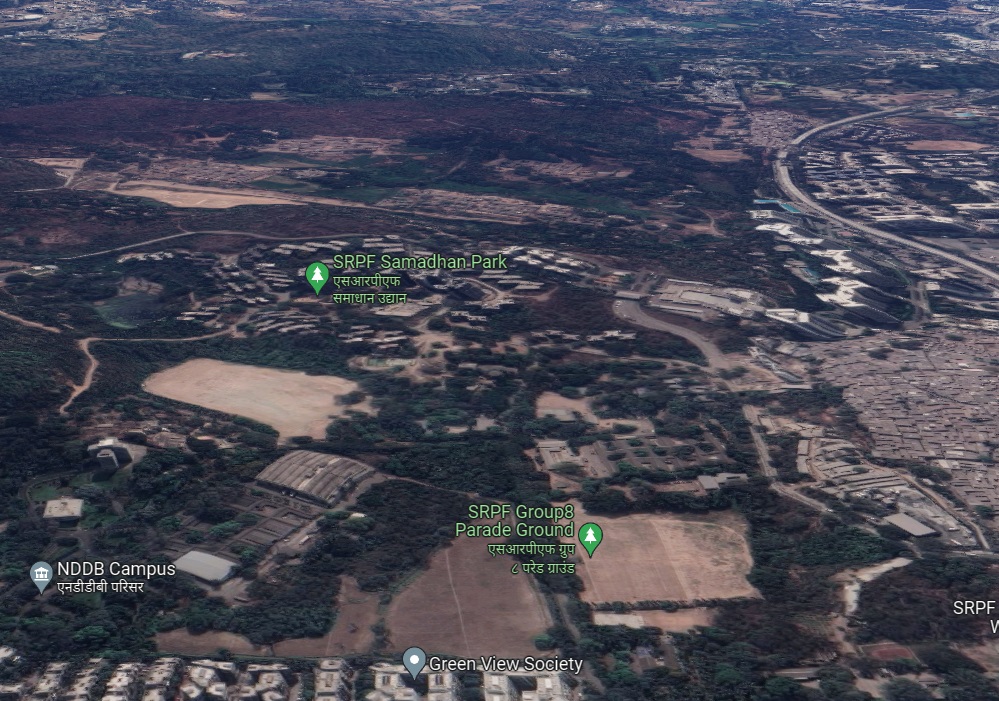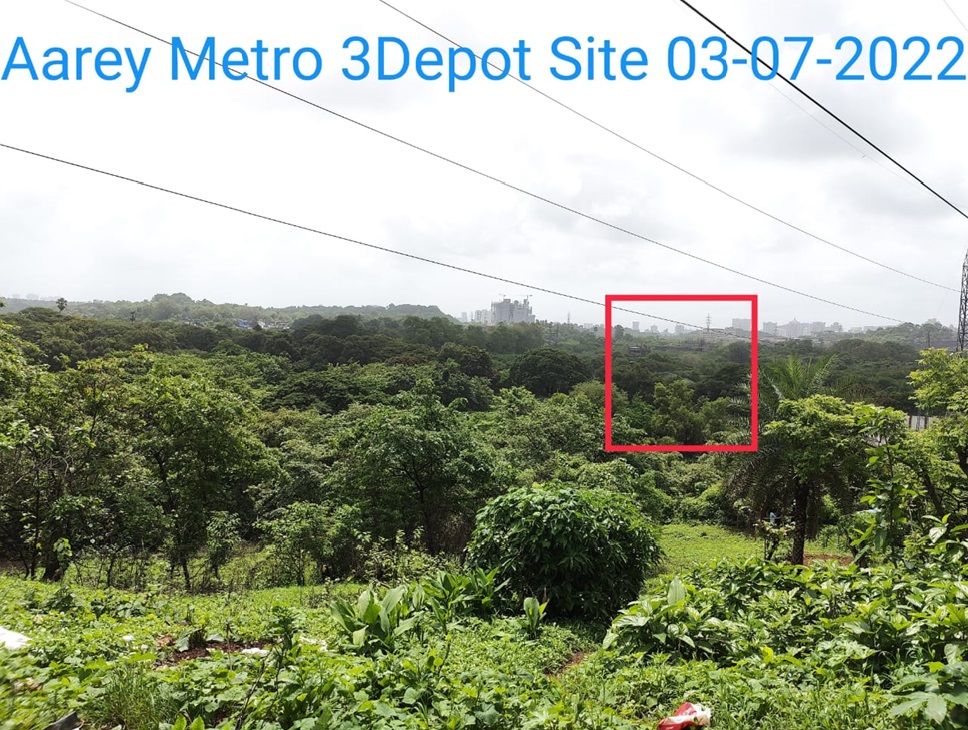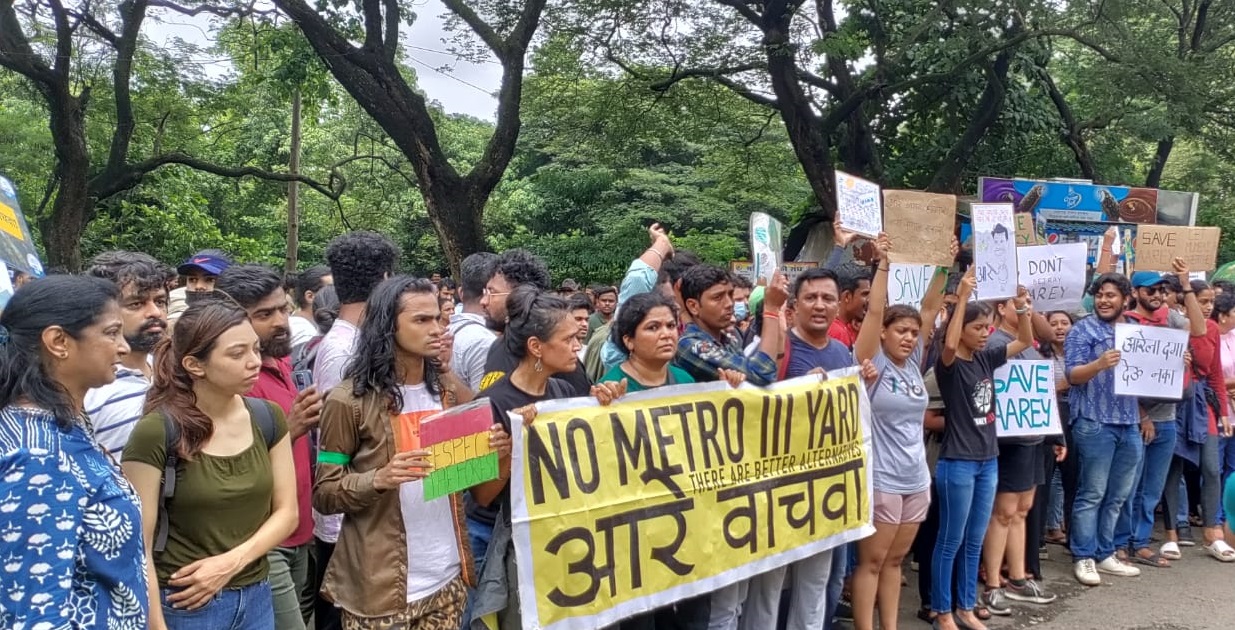Solpa Aarey Adjust Maadi
This is what will happen to the new area marked for the metro in aarey. This is the south east of Aarey.
The central portion was given for the SRP camp. And because of the high tension wire the electricity dept got controll of the forests under the power lines, Now they have their offices. Of course the property is now privatised after Addani took over the electricity distribution, for which they have their office space touching the highway to the west.. Now the tall buildings in the centre come up to replace the lowly structures as soon as the new privatised airport, changes the directions of their main take off funnel..and allows tall building in the non-tunnel area which cuts across aarey, making it a prime location for development, SRA, future premium buildings etc. The tall buildings on the right of this picture is in a location which was 'alienated' for a children's park and housed a huge amusement party till just two decades ago. The park was closed down as it was not financially viable and low and behold the oberoi buildings have come up and continue to come up along the south side of the original aarey left lung of Mumbai.
The west side ie from where this picture in taken was carved out for a transit camp, which became permanent and went in for MHADA redevelopment. 
Segment as seen in google maps

And this is what is look from the other side today..

(Pix-Aarey Conservation Group )
Where is the Laxman Rekha? Can we draw one now?

Esther Duflo
Esther Duflo: Nobel Prize banquet speech Dec 16, 2019 https://youtu.be/JjE6ZK8vvcE?t=46
Poverty..
The British Academy @BritishAcademy_ https://twitter.com/BritishAcademy_/status/1544344123037339648
"Duflo believes that politicians could implement ambitious climate action without provoking public dissent by making it part of a wider programme of wealth redistribution."
Esther Duflo: Social experiments to fight poverty
Esther Duflo and Abhijit Banerjee | After Poor Economics
55,163 views Sep 26, 2017 A radical rethinking of the way to fight global poverty.
Abhijit Banerjee 7:45
Esther Duflo 32:00
https://www.ubscenter.uzh.ch/en/news_...
For more than fifteen years the founders of the Abdul Latif Jameel Poverty Action Lab, Abhijit Banerjee (MIT) and Esther Duflo (MIT), have worked with the poor in dozens of countries spanning five continents, trying to understand the specific problems that come with poverty and to find proven solutions. Through a careful analysis of a very rich body of evidence, including the hundreds of randomized control trials that Banerjee and Duflo’s lab has pioneered, they show why the poor, despite having the same desires and abilities as anyone else, end up with entirely different lives. Their mission is to reduce poverty by ensuring that policy is informed by scientific evidence.
https://www.povertyactionlab.org
This keynote lecture was made possible by the Department of Economics at the University of Zurich alongside its partners UBS Center for Economics in Society and Swiss Re
Google Is Not What It Seems by Julian Assange
Google Is Not What It Seems by Julian Assange https://archive.ph/UDDBC#selection-693.93-693.365
Since at least the 1970s, authentic actors like unions and churches have folded under a sustained assault by free-market statism, transforming “civil society” into a buyer’s market for political factions and corporate interests looking to exert influence at arm’s length.
The civil society conference circuit—which flies developing-world activists across the globe hundreds of times a year to bless the unholy union between “government and private stakeholders” at geopoliticized events like the “Stockholm Internet Forum”—simply could not exist if it were not blasted with millions of dollars in political funding annually.
Nobody wants to acknowledge that Google has grown big and bad. But it has. Schmidt’s tenure as CEO saw Google integrate with the shadiest of US power structures as it expanded into a geographically invasive megacorporation. But Google has always been comfortable with this proximity. Long before company founders Larry Page and Sergey Brin hired Schmidt in 2001, their initial research upon which Google was based had been partly funded by the Defense Advanced Research Projects Agency (DARPA).48 And even as Schmidt’s Google developed an image as the overly friendly giant of global tech, it was building a close relationship with the intelligence community.
As the self-described “radical centrist”65 New York Times columnist Tom Friedman wrote in 1999, sometimes it is not enough to leave the global dominance of American tech corporations to something as mercurial as “the free market”:
The hidden hand of the market will never work without a hidden fist. McDonald’s cannot flourish without McDonnell Douglas, the designer of the F-15. And the hidden fist that keeps the world safe for Silicon Valley’s technologies to flourish is called the US Army, Air Force, Navy and Marine Corps.66
If the future of the internet is to be Google, that should be of serious concern to people all over the world—in Latin America, East and Southeast Asia, the Indian subcontinent, the Middle East, sub-Saharan Africa, the former Soviet Union, and even in Europe—for whom the internet embodies the promise of an alternative to US cultural, economic, and strategic hegemony.71
A “don’t be evil” empire is still an empire.
Page 29 of 53
